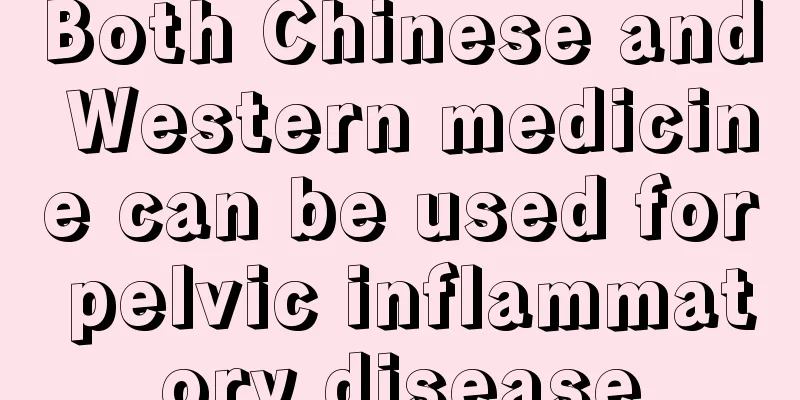Both Chinese and Western medicine can be used for pelvic inflammatory disease

|
Pelvic inflammatory disease is an inflammation of the female internal reproductive organs (uterus, fallopian tubes, ovaries) and their surrounding connective tissue and pelvic peritoneum, which can be limited to one or several sites. Having sex during menstruation, after childbirth, miscarriage, or after gynecological surgery if there is placenta or fetal membrane remaining in the uterine cavity, lax disinfection during surgery, or having sex without following the doctor's advice after surgery can all easily cause infection. The clinical manifestations of acute pelvic inflammatory disease vary depending on the type of infecting pathogens and the severity of the inflammation. They are often acute, severe, hot (chills, fever), and painful (lower abdominal pain). Abscesses may also form. At this time, antibiotics should be used as early as possible to eliminate pathogens, improve symptoms and reduce sequelae. It is best to choose antimicrobial drugs based on the pathogen and the results of drug sensitivity tests, but because drug sensitivity results take 5-7 days, doctors often choose antibiotics based on experience when starting treatment. Since acute pelvic inflammatory disease is mostly a mixed infection of aerobic and anaerobic bacteria, broad-spectrum antibiotics mainly based on bactericides are often used in combination with anti-anaerobic drugs. Such as the combination of quinolones and metronidazole; the combination of penicillin or erythromycin with aminoglycosides and metronidazole; the commonly used regimens for Gram-negative bacilli and gonococci include second-generation cephalosporins and third-generation cephalosporins. If chlamydia and mycoplasma are present, azithromycin should be added. Clindamycin combined with aminoglycosides is effective against infections mainly caused by anaerobic bacteria. The drug should be administered early, in sufficient amounts, and intravenously. Medication should not be changed frequently and the course of treatment should be long enough. When the inflammation is mild, oral antibiotics combined with Chinese medicine for clearing heat and detoxifying, promoting blood circulation and removing blood stasis can be used in the outpatient clinic, such as Yinqiao Jiedu Decoction, which can also be effective. Acute pelvic inflammatory disease can lead to chronic pelvic inflammatory disease. Currently, comprehensive treatment is often used, and 5 mg of α-chymotrypsin or 1500 units of hyaluronic acid can be injected intramuscularly. You can also choose Chinese medicine based on syndrome differentiation, such as for heat toxicity type: external use of wild chrysanthemum suppository, intravenous drip or intramuscular injection of Qingkailing, and oral administration of Fuke Qianjin tablets. Damp-heat type: Jinji capsule or granule. For the damp-heat abdominal stagnation type, Fule Granules and Fuyan Kangfu Tablets can be used. Blood stasis type: You can choose Women's Dysmenorrhea Pills, Guizhi Fuling Pills, Shaofu Zhuyu Pills, Tiaojing Yimu Pills, etc.
Traditional Chinese medicine promotes blood circulation, removes blood stasis, clears away heat and detoxifies Pelvic inflammatory disease belongs to the categories of "leucorrhea", "dysmenorrhea" and "mass-mass" in traditional Chinese medicine. Traditional Chinese medicine believes that the disease is mostly caused by congenital deficiencies, improper maintenance, unclean vagina or excessive fatigue. The main symptoms of acute pelvic inflammatory disease are dull pain, tenderness and rebound pain in the lower abdomen, accompanied by rapid heart rate, fever, and a large amount of purulent secretions in the vagina. The systemic symptoms of chronic pelvic inflammatory disease are low fever, fatigue, lower abdominal distension and pain, and lumbar pain. If the disease lasts for a long time, symptoms of neurasthenia may also appear, such as insomnia, lack of energy, general discomfort, etc. Generally speaking, in the acute and subacute stages, pelvic inflammatory disease is mostly treated with Western antibiotics, and Chinese medicine can also be used to clear away heat and detoxify, and promote blood circulation and remove blood stasis. Chronic pelvic inflammatory disease can easily cause adhesions around organs due to long-term inflammatory stimulation, making it difficult for anti-inflammatory drugs to enter the body. Therefore, antibiotics are not very effective at this time, and traditional Chinese medicine treatment can instead highlight its advantages. Currently, most patients with chronic pelvic inflammatory disease are treated mainly with traditional Chinese medicine. For patients with chronic pelvic inflammatory disease, anti-inflammatory drugs can also be used appropriately during menstruation. Because pain is the main symptom in the chronic stage, the syndrome is diagnosed as qi stagnation and blood stasis. The treatment can focus on promoting blood circulation, removing blood stasis, relieving pain and strengthening the body. In addition, some patients may experience abnormal leucorrhea, which can be treated with dehumidifying drugs, but it is not suitable to use drugs that are too cold, which can be resolved through warming and promoting circulation. Due to the differentiation of symptoms and the use of medicine, the effects are generally good. Pelvic inflammatory disease can be treated with Chinese medicine decoctions, Chinese patent medicines can be taken orally, and methods such as external application of Chinese medicine, enema, and ion introduction of Chinese medicine can also be used. Depending on the condition, the treatment methods vary. Generally, decoctions are mainly prescribed according to the syndrome differentiation of the disease, and corresponding Chinese patent medicines are used in combination, such as Jingangteng Capsules, Kangfuyan Capsules, Fuyanshu Capsules, Tiaojingleucorrhea Pills, Fuyankangfu Capsules, Women's Dysmenorrhea Pills, Fuyanxiao Capsules, etc. |
<<: You can tell whether a woman is smart or not by looking at this
>>: How to treat chronic pelvic inflammatory disease?
Recommend
I have blood again after one week of my period.
There is blood again a week after the menstrual p...
What to do if you vomit acid during late pregnancy
During pregnancy, fluctuations in female hormones...
Diagnostic criteria for gestational diabetes
Gestational diabetes is a disease that a woman de...
How long has it been since your period came that you can use a pregnancy test stick
Everyone knows that if a woman's menstruation...
What causes deep vaginal itching?
There are many factors that cause itching deep in...
Canalys: Southeast Asia smartphone shipments to grow 20% year-on-year in January 2024
Highlights of the five major markets in Southeast...
Why do nipples itch sometimes?
When female friends have itchy nipples, they shou...
Why can't pregnant women eat persimmons?
There are many foods that pregnant women need to ...
Eight strategies to say goodbye to gynecological diseases!
Diseases such as breast cancer and ovarian cancer...
Is eyebrow tattooing harmful to the body?
The appearance of eyebrows is basically natural. ...
Can breast discharge heal on its own?
Whenever a baby is born, there are always many pr...
What should I do if I have bilateral breast duct ectasia?
Breast disease is a disease that many people will...
99% of women wear this dress wrong
Women's underwear is the most private clothin...
What to do if you are pregnant with cholecystitis
If a patient with cholecystitis becomes pregnant ...
Is cervical screening painful?
In our lives, many women suffer from gynecologica...









